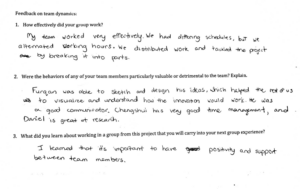“acknowledge your and others’ range of linguistic differences as resources, and draw on those resources to develop rhetorical sensibility”
At first I was a bit confused about this learning outcome, because I did not understand how I could use “linguistic differences” as resources. However, I realized that through group work, my peers and classmates have done this unintentionally. My group members were from similar majors as me, Computer Science and Computer Engineering, but our diverse backgrounds meant that we had different experiences, strengths and weaknesses when it came to writing. As someone with a specialty in English, I was often elaborating more in my writing with concise language, and I was able to speak confidently during presentations. On the other hand, my group members were better at researching, creating the presentations and also calculating important data. Below, Figure 1 shows my peer rubric report on my group members, where I answer questions about some of my group member’s strengths. Sometimes their linguistic differences actually helped balance out mine, because I can write too much, while my peers knew what main points to keep and what to get rid of. I do think that my understanding of this learning outcome could be improved.


